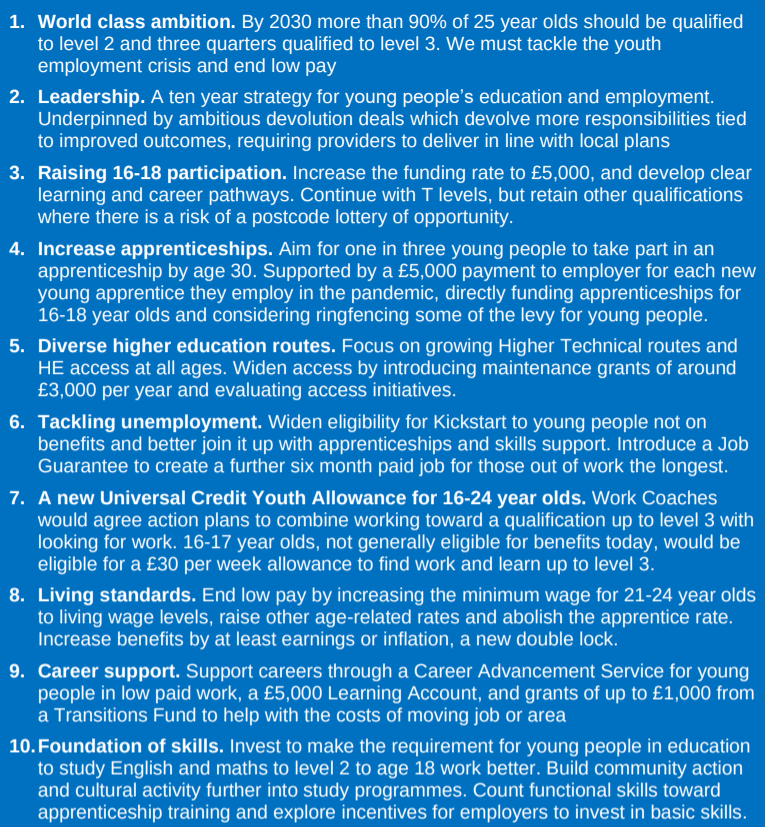The Youth Commission at Learning & Work have explored the impact of inequalities on young people’s life chances. Across five research reports the Learning and Work Youth Commission have demonstrated that the UK lag behind other countries on many measures and progress has therefore been hindered. You can read more about the Youth Commission here.
The final report, Unleashing Talent: Levelling Up Opportunity for Young People, sets out a blueprint for change and calls for urgent action to tackle the youth employment crisis. Alongside this the report asks for a higher ambition for both education and employment, measured against the best practice and examples worldwide in order to ‘build back better’ after the current health and economic crisis. You can access the full report here.
Key Findings
A Higher Ambition
This new research has found that there is a real risk of creating a pandemic generation of lost opportunities; one million young people could be not in employment, education or training (NEET), up to 350,000 long-term unemployed. This is reflected in a rising claimant count that has doubled since March but also the fact that only 80% of young people gained a level 2 qualification at 19 years old and only 60% a level 3, lower than other countries.
This report acknowledges that this ‘levelling up’ requires investment, with the recommendations in the report needing an additional £4.6 billion per year (this would be a 22% increase on pre-crisis spending). This translates as £1 billion for Apprenticeships, £1.75 billion to expand high quality education for 16-18 year olds in education, particularly technical education, an additional £1 billion to tackle unemployment and £360 million for career guidance and support.
A Blueprint for Change
The Case for Change
The report states there are four principles of the case for change:
- Prevention is better than cure. Building a good foundation of skills, including literacy and numeracy, helps young people adapt to future change.
- Fairness. Young people’s chances should depend on their talent and hard work, not their background or parents income.
- Lost talent makes us all poorer. The strong link between parental background and young people’s outcomes means we are wasting talent.
- Winning the global race. The number of young people will grow by 12% by 2030; this will hinder the UK’s economic development if the youth employment crisis goes unsolved.
The Youth Commission also states that the challenges facing young people requires more than just fiscal investment, and calls for a much needed joined up approach between national Government, local government, employers and education providers.
Recommendations
The Case for Change
- The government should set an overall strategy and reach ambitious devolution deals with local government. These would give a single funding pot (potentially including employment and skills programmes and National Careers Service funding) tied to outcome agreements showing how better results will be delivered. Providers should be required to adhere to local plans, with areas able to take direct action if they do not.
World Class Learning, Skills and Apprenticeships
- Call on government for a coherent ‘participation plan’ to increase education participation, and to support delivery of high quality learning by increasing the 16-18 funding rate to £5,000
- The participation plan should set out how T levels fit into learning pathways. We should not cut funding for other successful qualifications until T levels are proven and widely available
- Aim for one in three young people to participate in apprenticeships by the time they are 30 years old, by directly funding apprenticeships for 16-18 year olds and a £5,000 incentive for employers who take on young apprentices.
- Focus on growing higher technical routes and degree apprenticeships, and reintroduce £3,000 means-tested maintenance grants.
Full and Fulfilling Employment
- Government must widen Kickstart eligibility to young people not on benefits and introduce a Job Guarantee, ending youth long-term unemployment by subsidising jobs for six months.
- Introduce a new Youth Allowance in Universal Credit for 16-24 year olds to combine improving basic skills and working toward a level 2 or 3 qualification with looking for work.
- End low pay by raising the minimum wage for 21-24 year olds to two thirds median wages over time and removing the separate apprentice rate.
- Extra help to climb the career ladder including a new Career Advancement Service, a £5,000 per person Learning Account, and a Transition Fund to help with the costs of moving jobs or areas.
Building a Foundation of Skills
- For aged 16-19 study, there should be a continued requirement for young people in education to study English and maths to level 2, investing in new ways to improve pass rates; and build community action and cultural activities more fully into study programmes
- In apprenticeships, functional skills learning should be counted in training requirements, checking this is contextualised with other learning and does not displace the core vocational content. The Institute for Apprenticeships should work with providers to assess whether the functional skills funding rate is sufficient
- Government should also look at flexibility in the Apprenticeship Levy and options for tax incentives to encourage employers to invest in basic skills.
- Invest more in basic skills for young people through the Adult Education Budget, Shared Prosperity Fund and National Skills Fund.
Our Commentary
The Learning and Work Institute, along with many others, have been warning for months that young people risk being left behind due to the pandemic and through no fault of their own. We welcome the challenges presented to the Government in this report that calls for better opportunities for young people going forward, whether that be in education, employment or training.
To make all of this work, the missing piece is good quality, clear careers information -in one place that is accessible to all young people. Our Careers Hub and Journey to Work offer this to young people; clear advice on the skills, qualifications and opportunities each individual needs to get to where they want to be.
Much of our research in the Youth Voice Census falls in line with this research; young people tell us that the careers paths put in front of them are confusing, and that they vary and are distorted by gender, race and ethnicity, disability and additional needs, disadvantage and location. It is not an even playing field for young people and this strong research and recommendations call for bold Government action to address this.
The work of the APPG for Youth Employment saw an inquiry into the Plan for Jobs; where it could be successful but also where it may not reach the intended targets and leave some young people behind. We called for similar actions around vocational and technical education and training, around apprenticeships and similar concerns around Kickstart. You can read this report here.








